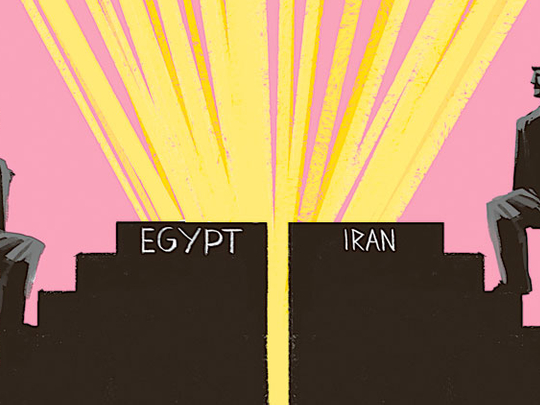
Is the US about to commit new political mistakes in the region, in addition to those committed in the past? Perhaps. This question is in no way related to what is currently happening in Iraq.
If there is a final agreement on Iran’s nuclear issue between Iran, the US and Europe, Tehran will become a key player in the Gulf and Arab peninsula. The dossier will be closed, economic sanctions on Iran will be lifted and the country’s oil exports will increase over the course of the next two years to reach five million barrels per day. The domestic situation, where there is currently 35 per cent inflation and 18 per cent unemployment, will begin to improve. The region will change with a new Iran, under an approach that it has strived towards for many decades and is now about to achieve.
An agreement has already been reached by all parties regarding Iran’s nuclear dossier. The only matter delaying the official announcement of the final signing of the agreement is Tehran’s demand to play a key role at the regional level, particularly in the Arab world. It will not be easy for the country to play a regional role unless certain criteria are met: Iran entering an alliance with the US and Israel, the role of Turkey being neutralised despite the fact that it is a Nato member and forbidding the emergence of another regional power that may be equal to Iran at any level or detract from its regional role.
Many political analysts will probably find these statements odd. However, this is a summary of clear indications made in reports published by American and European newspapers. It is well-known that politics is not simply about issuing statements for media’s consumption, but rather agreements made behind the scenes to achieve strategic benefits for a country. This is regardless of the quality of these assurances and their legitimacy; the aim is to ensure the achievement of these benefits. Amidst celebrations on the election of Abdul Fattah Al Sissi as the President, Egypt ushered in a new historic phase at many levels. People in Egypt and the Arab world are very hopeful that the new Egypt is the one that they had desired, sympathised with and supported during the revolution.
Now, the Egypt that they always wished to see is almost a reality: A strong, booming country in which development prevails in all fields, particularly in agriculture and industry, which are the key sectors of the economy. A country that is a regional leader raising the status of the Arab nation. A country that has a new strategic vision that the Arab people always waited for.
The question is: Does the transformation of Egypt have the strategic vision that the Arab people are hoping for? It is difficult to say so, simply because the country has to undergo the transition period, regulate approaches of development on the domestic level and review key components and principles of its foreign policy. This is a difficult long-term process which, naturally, contains obstacles, and includes foreign challenges that need to be addressed immediately.
Is it possible to understand the relationship between the transformation of Egypt and the strong support it received from rich Gulf Cooperation Council countries, like Saudi Arabia and the UAE, in light of what we have already discussed in terms of reality and political ambitions? Perhaps. The Arab nation has gone through many periods of advancements throughout its modern history. During some periods, one can almost see that the nation is about to become a leader, taking initiatives. If anyone inspects these periods, they will try to understand the foundations for the political and economic advancement. What do they see? They see Egypt, a regional leader, a nation that spearheads a triangle, its sides represented by a Gulf country, and Syria or Iraq.
Egypt, during its developmental transformation, is presently depending on two rich Gulf countries. That means the nations in the aforementioned triangle are now different, and the old equation no longer applies. This advancement is now based on a new equation, regardless of the history of either Gulf countries and their political doctrine and national role in the past. Will Arabs be able to cope with the political movement between Iran, US and Israel? It is hard to tell because, unfortunately, Arabs do not have a clear-cut strategic vision. As a result, Iran does not view them as significant players and neglects them and does not spare them a thought because they never will pose any danger to its interests.
Iran’s perspective would perhaps have been logical had it been based on geopolitical calculations. However, the current reality indicates that it is an outdated perspective, due to many changes in the circumstances of Arabs in various fields, and some of these changes are imminent.
In the light of such a scenario, Egypt is perhaps the only Arab candidate that can face up to Iran in the long term. The process of Egypt’s rise will take time as it needs to catch up to the levels reached by Iran in various areas, particularly in the military field. Iran has devoted its expertise to the production of non-conventional weapons such as cruise missiles and drones, at a time when Egypt halted developments in this field for many years.
The financial support given by some Gulf countries to Egypt’s development will effectively shorten the time-frame for developmental phases and will ensure their completion in record time. However, matters such as training and the transfer of know-how and expertise will require a long time. During the time spent waiting for the completion of these phases, countries in the region must deal with Iran diplomatically. This will perhaps pave new paths that shed light on realities such as dialogue, reasoning and wisdom, which have lost their lustre in the chaos.
Mohammad Hassan Al Harbi is a writer and journalist.











